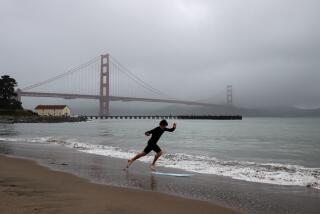Federal court to rule on restrictive concealed weapons permits
- Share via
reporting from SAN DIEGO — Federal appeals judges on Tuesday peppered attorneys for 2nd Amendment advocates about why the longtime rule of the San Diego County Sheriff’s Department to determine who receives concealed weapons permits should be struck down.
Paul Clement, former U.S. solicitor general who is representing a journalist who was denied a permit, said that while it is not improper for a county sheriff to set rules in such cases, the San Diego rule requiring an applicant to show “good cause” why they need a permit is too strict.
Among other things, Clement argued, Sheriff Bill Gore has no evidence that issuing more concealed weapon permits will lead to an increase in violence. Other counties have more reasonable rules, he argued.
“If my client was so fortunate to live in Sacramento County,” he would already have a concealed weapon permit, said Clement, who has represented the National Rifle Assn. in other gun cases.
The justices, although appearing skeptical, did not indicate whether they would overturn a 2-1 decision by a panel of the 9th Circuit Court of Appeals that found the San Diego County rule too restrictive. A ruling is expected within a few months.
The 11-member panel is composed of eight judges nominated by Democratic presidents, three by Republicans.
But Chuck Michel, attorney for the California Rifle and Pistol Assn., said after the 75-minute session, held in San Francisco, that it is “too simple” to say that the case will be decided on party lines. “We remain very hopeful,” he said.
Clement argued that there is nothing wrong with the sheriff requiring an applicant to take a gun-safety course and not have a criminal history. But requiring an applicant to explain why he or she needs a gun for their safety violates the 2nd Amendment, he said.
The two sides in the dispute agree that the issue may ultimately be decided by the U.S. Supreme Court.
The case began when journalist and former police officer Edward Peruta felt his 2nd Amendment right to bear arms had been violated when he was turned down for a concealed weapons permit. He felt that the county’s “good cause” standard was both unfair and illegal.
Other people who had also been rejected for a permit agreed and joined the litigation, championed by the NRA and other groups. A trial court in San Diego rejected Peruta’s assertion and upheld the Sheriff’s Department rule.
But on appeal, a panel of the 9th Circuit Court of Appeals ruled 2-1 in Peruta’s favor in 2014, essentially striking down the Sheriff’s Department policy.
The panel struck down the way that the San Diego County department interprets the state law but left intact the law itself, which gives individual sheriff’s departments the authority to issue concealed weapons permits.
While the panel’s decision only directly involved the San Diego County department, other sheriff’s departments moved to change their policies to conform with the ruling.
The San Diego department, however, did not, opting instead to hold permit applications in abeyance until the issue has completed its journey through the courts. As of this week, the department has 2,147 applications in abeyance.
Gore, who had inherited the policy from his predecessor, decided not to file an appeal. But in March, state Atty. Gen. Kamala Harris, calling the case “one of exceptional importance,” asked that it be heard by all 11 judges, setting the stage for Tuesday’s hearing.
Among other issues, the judges asked a lawyer from the state attorney general’s office why the attorney general waited so long to appeal.
If the 9th Circuit Court of Appeals upholds the panel’s decision, it could mark a precedent that would increase the rights of gun owners throughout the state. Tuesday’s hearing also involved a similar rule in Yolo County.
Twitter: @LATsandiego
More to Read
Sign up for Essential California
The most important California stories and recommendations in your inbox every morning.
You may occasionally receive promotional content from the Los Angeles Times.










